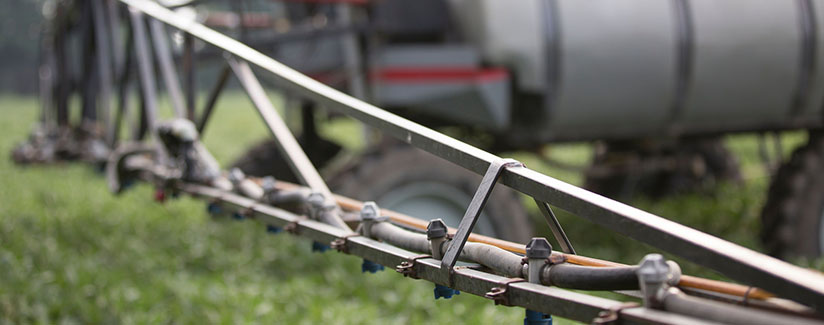
Are We Being Poisoned By Glyphosate?
Glyphosate, also referred to as “Roundup,” used in agriculture to kill weeds, has been in the news lately. We wondered, what are the human health implications of glyphosate use on crops? Is glyphosate poisoning us? To find out more, we reached out to Jeff Graybill, MS, CCA, Agronomy Extension Education at Penn State University.
Are more chemicals used on GMOs than other crops/foods?
Jeff Graybill:
There is potential for less to be used, especially on crops that have a GMO technology that provides insect resistance. This means you can use less insecticide because the plant is producing a natural chemical that protects it from the pest.
When it comes to weed control, as more farmers use no-till farming (farming without plowing, allowing for much less disturbance to the soil) and work to build a more healthy and natural soil, they have to find a way to control the weeds without tillage. If farmers are growing non-GMO corn, they will often still use glyphosate to control the weeds before the corn is planted. If farmers are growing GMO corn, glyphosate can be used over the top of the corn because it is no longer affected. In most cases, glyphosate is used regardless of whether it is a GMO, and it does an excellent job of controlling the weeds. It’s not that more chemical is used if it’s GMO. The timing of the chemicals is just different.
What safeguards are in place to ensure GMOs sprayed with pesticides are safe?
Jeff Graybill:
The United States has an extensive regulatory system, and whether it’s industrial chemical or household chemical or herbicide or insecticide, it goes through very extensive toxicology testing to look at the benefits and the negatives of the product. Since these chemicals are designed to kill something, when you’re looking at human and animal health implications, the regulatory agencies have very stringent standards. Any pesticide that comes to market has to be approved and certified by the EPA and other federal agencies. One of the common complaints is that the companies that sell the chemicals do the testing. This is true, but these companies are the developers of the chemicals and know them the best. They provide data to the EPA and USDA and then, that data, no matter who created it or did the research, is peer reviewed and is combed over very intensely. The government agencies then make a determination if there are any negative impacts and whether those negative impacts are outweighed by the good that the chemical will do.
How do I know there is no chemical residue on fruits and vegetables, especially those that are GMOs?
Jeff Graybill:
There can be chemical residues no matter what the product is. Whether it’s a naturally-occurring pesticide that some of the organic farmers use or one that’s manufactured, which is often based off of a compound that’s found in nature, there are tolerances set for what is a safe standard of residue. I heard a professor say one time, if you could go to the North Pole and you had instruments that were fine-tuned enough to detect parts per billion, you could find a trace of every manmade chemical that’s ever been produced in the environment. So we have to face the fact that there may be residues, but based on EPA testing, the residues are deemed safe and acceptable. It’s always a good idea to wash your fruits and vegetables because they can have very small amounts of chemical residue. The government does random testing of food to test for residues, making sure the amount of residues are below the standard determined to be safe, very similar to a drinking water standard.
Are the chemicals or products used on GMOs safe?
Jeff Graybill:
They’ve all gone through extensive testing, but they are a pesticide. They are designed to kill living organisms. If they aren’t used properly, they are not safe. But that said, if products are used according to the label, the benefits far outweigh the costs and this is true of all chemicals and pesticides, not just ones created with GMO technology. If we looked at our food system 50 years ago, we lost millions of dollars of food to insect damage and lower yields due to weed competition. We don’t see that today, because the crops are protected with chemicals.
Is it true that glyphosate, one of the chemicals used on GMOs, can cause cancer?
Jeff Graybill:
I use chemicals a lot, and I grew up on a farm. These chemicals have a label on how to use them properly, and also a material safety data sheet (MSDS), which provides information on all of the health hazards associated with that product and how to handle it. It will list all of the issues associated with it, whether it is carcinogenic, for example, whether it will cause a rash, and at what levels it would be safe (similar to drinking water standards). The MSDS for glyphosate does not list it as a known carcinogen. There are plenty of other products that at high levels, are. Glyphosate has been used for almost 40 years, long before GMO crops, and it is considered one of the safest pesticides to use because it has very low mammalian toxicity and isn’t considered a carcinogen. In my mind, glyphosate is one of the safest chemicals.
How do I know my food has not been sprayed with unsafe chemicals?
Jeff Graybill:
If you want to ensure your food has not been sprayed with chemicals, you can grow your own crops, and pick the bugs off before they destroy the food you’ve grown, and weed your garden by hand. You could also buy USDA certified organic, which would be the best way to ensure that no synthetic chemicals were used. I think people’s concern that they are eating healthy food is great, but I don’t think we’re putting things in the proper perspective. We’re concerned about a few parts per billion of pesticide residue, which I believe is not much of a danger.
Should I be worried about pesticide use?
Jeff Graybill:
We should always be worried about pesticide use. I work around chemicals and we have to respect them, but I realize, when used properly, these chemicals allow society to have a higher standard of living, as fewer people are growing our food that’s also higher quality food and are able to distribute it around the country and world. There can be negative effects, but only if it’s not used appropriately. You know – gasoline is very dangerous, it’s very explosive, but should we quit using it? Maybe, but what are we going to replace it with? We need to embrace the science and technology to understand the risks. When the chemicals are handled properly, they are very safe and productive.
Would you eat food that has been treated with glyphosate?
Jeff Graybill:
Yes, but I would still wash fresh food before I eat it.
For more information, see What’s the Safest Way to Clean Produce? and Should I Wash Fresh Fruit in Vinegar?
“Sprayer Maintenance” by United Soybean Board is licensed under CC BY.


























